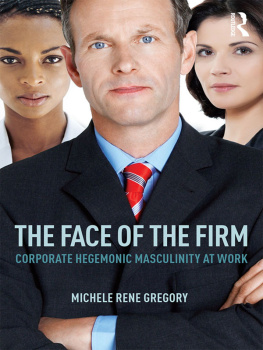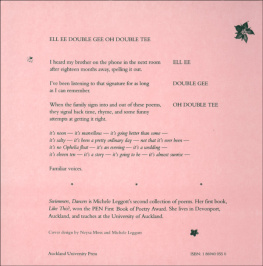THE FACE OF THE FIRM
Despite decades of greater awareness of gender at work in Western countries, gender inequality in the executive suites is alive and well. The Face of the Firm highlights new critical perspectives on the relationship between hegemonic masculine cultures, gender embodiment and gender disparities in corporate organizations. Using multiple methodologies including over 100 interviews, mainly with British female and male executives in the UK who worked for some of the most prestigious American and British multinational advertising agencies and computer companies, the book makes important connections between the empirical data and contemporary sexism in the UK and US. The book refocuses the debate of executive work, organizational spaces and gender inequality on gendered bodies at work. It also demonstrates that gendered and sexualized relations among executives often construct the production process. The book makes a contribution to masculinity, gender and work scholarship and is organized along three key concepts: homogeneity, homosociability and heterosexuality. These address such factors as the organizational locker room, sexual and heterosexual spaces at work and the construction of women and men as different workers. This conceptual model is crucial for evaluating the mechanisms that support male dominance among highly-skilled professionals and executives.
Michele Rene Gregory is Associate Professor of Sociology at York College of The City University of New York, where she teaches courses on race and ethnicity, sociology of work and complex organizations. Her research focuses on managerial masculinities, athletic embodiment in organizations, and gender, sexuality, race and ethnicity in the workplace.
THE FACE OF THE FIRM
Corporate Hegemonic Masculinity at Work
Michele Rene Gregory
First published 2016
by Routledge
711 Third Avenue, New York, NY 10017
and by Routledge
2 Park Square, Milton Park, Abingdon, Oxon, OX14 4RN
Routledge is an imprint of the Taylor & Francis Group, an informa business
2016 Taylor & Francis
The right of Michele Rene Gregory to be identified as author of this work has been asserted by her in accordance with sections 77 and 78 of the Copyright, Designs and Patents Act 1988.
All rights reserved. No part of this book may be reprinted or reproduced or utilised in any form or by any electronic, mechanical, or other means, now known or hereafter invented, including photocopying and recording, or in any information storage or retrieval system, without permission in writing from the publishers.
Trademark notice: Product or corporate names may be trademarks or registered trademarks, and are used only for identification and explanation without intent to infringe.
Library of Congress Cataloging in Publication Data
Names: Gregory, Michele Rene, author.
Title: The face of the firm : corporate hegemonic masculinity at work / Michele Rene Gregory. Description: New York, NY : Routledge, 2016. |
Includes bibliographical references and index.
Identifiers: LCCN 2015033393| ISBN 9781612058436 (hardcover) |
ISBN 9781138189003 (pbk.) | ISBN 9781315641935 (ebook)
Subjects: LCSH: Sexual division of laborGreat Britain. | Women in the advertising industryGreat Britain. | Women computer industry employeesGreat Britain. | Sex discrimination against womenGreat Britain. | SexismGreat Britain. | MasculinityGreat Britain. | Corporate imageGreat Britain.
Classification: LCC HD6060.65.G7 G74 2016 |
DDC 306.3/6dc23 LC record available at http://lccn.loc.gov/2015033393
ISBN: 978-1-6120-5843-6 (hbk)
ISBN: 978-1-138-18900-3 (pbk)
ISBN: 978-1-3156-4193-5 (ebk)
Typeset in Adobe Caslon
by Out of House Publishing
I am extremely grateful to the women and men in the advertising and computing industries, and to the many professionals associated with these industries, who found time in their busy schedules to talk to me about their experiences and observations regarding gender at work. Although these women and men must remain anonymous, their comments are the foundation of this book. Without their input, this project could never have taken place.
I am also most thankful to and for my family. My parents, Dick and Lillian Gregory, have provided me with constant support and have been an ongoing source of strength and inspiration. My parents-in-law, although now both deceased, were two of my biggest cheerleaders, and I take some comfort in knowing that the completion of this book would have made them so very proud. I am truly indebted to my partner, Susan Alice Fischer, for tirelessly discussing my work with me, reading multiple drafts of the book, and most importantly, for her sense of humor, fierce work ethic, compassion and integrity. My siblings and siblings-in-law have been a constant source of both support and pride. One dear friend, the late Diana Leonard, was so instrumental in providing me with advice regarding the research from the very onset. Diana was also someone whom I visited frequently in London, and I was fortunate to be the recipient of her generosity and to bear witness to her excellent wit and intellect.
I am deeply thankful to all of my dear friends in the UK for their support, many of whom hosted me. In particular, Chantal Brotherton-Rattcliffe and Frances Tomlinson welcomed me into their homes for extended periods of time, and Frances spent endless amounts of time discussing my research with me and providing valuable feedback. My friends and colleagues at York College, as well as those from other academic institutions in the US and elsewhere, have been so encouraging that I also want to extend my thanks to them. I would also like to express my gratitude to York College for providing me with much appreciated course release time. I am extremely grateful to Dean Birkenkamp and his colleagues at Paradigm for all of their support from the beginning to the very end, and to Amanda Yee, copy editor Gail Welsh, and all of the Routledge team.
This book is about the relationship between masculine cultures, gender embodiment and inequality at work. It is also about different forms of structural power and, at times, the abuse of power. The purpose is to show how endemic and diverse gender inequality was in the British advertising and computing industries during the Thatcher era, but also to illustrate that there is a mechanism of inequality that is still in place today in many industries and organizations and not just in Britain, but in the US and other Western societies.
THE PLACE
The mid- to late-1980s was a period of exceptional change, politically, economically and socially, in the UK the worlds fourth largest economy. This was at the height of power of Margaret Thatcher, Britains first, and to date, only, female prime minister. The Thatcher years were emblematic of changes such as Big Bang the deregulation of Britains financial markets and a move from paternal to more hyper-masculine business environments. The Thatcher administration was one of Britains most conservative governments, severely curtailing what many had come to see as mainstays of Britain the welfare state and the power of unions. It was a new era for business entrepreneurship and institutional capitalism. In addition, with the governments help, portions of national industries such as transportation and coal would eventually be offered to private free marketers. Public industries were out and privatization was in. Because of her conservative revolution, and sometimes because of her gender, Thatcher provoked extremely strong reactions both positive and negative to those in the media and the academic community about the changing nature of work and gender in the workplace.1 For many interviewees in this study Thatcher was the right leader for a pro-business environment, and many female interviewees also felt that the prime minister was their champion a woman in the countrys most powerful position. Many male interviewees took a strong dislike to the prime minister as a woman, as they believed that she was far too aggressive. Some women and men loathed the prime ministers conservative agenda, especially her cuts in social services and her anti-union, anti-feminist and anti-equal opportunities stance.














